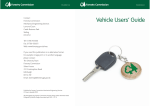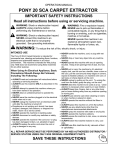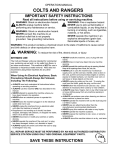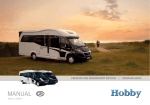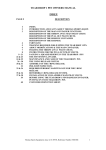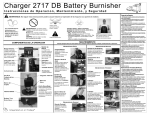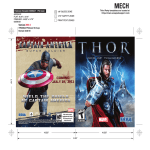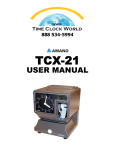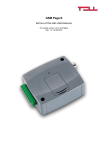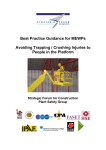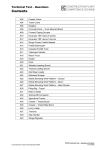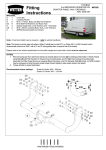Download Mobile Lighting Towers
Transcript
Mobile Lighting Towers HD-S Operation & Maintenance Manual +44 (0)843 855 0068 www.heimdalluk.co.uk Contents Make a note of the machine Vehicle Identification Number (VIN) in this box for future reference and when ordering replacement parts. 1. Introduction 5 2. General Safety 6 It is the responsibility of the operator to read and understand the contents of this manual before operating the unit for the first time. 3. Know Your Unit Technical Data Towing Legally Vehicle Identification Number (VIN) Other Legal Requirements Road Lighting Safety Decals 8 10 12 12 12 14 15 The Operators Manual must accompany the unit at all times. If the unit is resold the Operators Manual must be given with the unit to the new owners. 4. Licence / Towing the Unit Attaching the Unit to the Towing Vehicle Manoeuvring the Unit Reversing the Unit 24 28 33 34 5. Controls Support Legs Control Panel Mast Raise / Lower control Main Isolator Engine / Generator Information Panel Status Indicators Fault Icons Smart Stability System Manual Hydraulic Override 36 38 39 39 40 41 42 44 49 VIN 2 The world’s most advanced lighting towers CONTENTS Please read and follow all instructions before operating the unit Mobile Lighting Towers Operation & Maintenance Manual 3 6. Setting Up Positioning Arriving on Site Deployment Starting the Engine Stopping the Engine Deploying the Support Legs Stowing the Support Legs Adjusting the Lamps Rotating the Mast Raise & Lower the Mast Lifting Procedure 50 50 50 50 51 52 52 53 53 54 55 56 7. Maintenance Maintenance Schedule Changing or Removing a Wheel Brake Maintenance Changing Engine Oil 58 59 60 61 62 8. Warranty 64 9. Fault Finding 66 www.heimdalluk.co.uk Description The Heimdall range of mobile lighting towers are road towable units suitable for the illumination of public events, street works and emergency situations. To avoid personal injury, before using this equipment carefully read these instructions and ensure you understand them. If there is anything you do not understand, DO NOT use this equipment, and contact your supplier for advice. These self contained units can be rapidly installed to provide constant illumination over a large area. Ensure everyone responsible is fully conversant with the procedure for attaching the towing vehicle, towing, loading, setting up and operating the unit. Certain information in this manual is governed by law and is subject to change without prior notice. This is their intended use. Electrical supply is from a built in generator. The units cannot be used for the support of any other equipment without the prior design consent of the manufacturer. Great care has been taken to ensure that the information is correct at the time of publication. However, it is the users sole responsibility to ensure that they fully comply with all legal requirements. Guidance The information and instructions included in this manual are provided to help you get the best possible service from your lighting tower. To ensure that the unit is used safely and responsibly, we strongly recommend that this manual is read by all users prior to its operation, and that the recommendations are followed at all times. Heimdall operates a policy of continuous improvement and reserve the right to change specifications without notice. 4 The world’s most advanced lighting towers 5 www.heimdalluk.co.uk 1. INTRODUCTION 1. Introduction Thank you for purchasing this Heimdall mobile lighting tower Safety Safety is everyone’s responsibility Before using this equipment and to avoid personal injury, carefully read and understand these instructions. If there is anything you do not understand, DO NOT use this equipment, contact the supplier for advice. Risk Assessment Make sure you are aware of all the safety requirements and that this equipment is suitable for the location. It is the user’s responsibility to carry out a full risk assessment before siting the unit, to establish a safe zone including (but not limited to): Ground hazards Site preparation, suitable smooth level ground capable of bearing the mass of the unit in all weather conditions. When manoeuvring the unit into position, if working on a public road or in a public accessible space use the high intensity warning beacons fitted to the towing vehicle or its hazard warning lamps to raise awareness of its movement. If visibility is limited use a banksman or other assistance to guide you. Site hazards When raising or lowering the unit, the area must be cordoned off to create a safe zone, isolating the unit from the general public and bystanders. Overhead hazards Proximity to power supply and communication cables, lighting systems and other services. This equipment must not be moved, set up, used or dismantled by persons who are under the influence of alcohol or drugs. Do not use this equipment if you are tired or unwell. The equipment must not be operated, moved or used by any person not deemed competent to do so. You MUST perform a risk assessment before siting this equipment to ensure your safety and the safety of others. Wear suitable personal protective equipment whenever making adjustments to the unit. Do not wear loose jewellery or clothing that may get in the way or become trapped in the mechanism. Proximity to underground services etc. If permission is required, obtain it before use. Proximity to other buildings trenches and equipment, clearances for exhaust outlet and ventilation where required. Preparation for Towing Before towing the unit, • Switch the generator OFF. • Make sure the Mast is fully retracted and locked in the transport position. • Make sure the support legs are fully raised and locked into position with their pins. • Close and secure all protective covers. • The unit must not be used as a payload trailer, additional items carried in the trailer may cause the unit to be overweight. Work Area Preparation Carefully inspect the unit before towing or before use. If there is any doubt about its condition, DO NOT CONTINUE. This equipment may only be used on smooth level ground, which is able to bear its weight and its load. Survey the ground area where the unit is to be used, clear it of obstructions, anything that may puncture the tyres and similar items. Once the unit is in the work area, use barriers, signs and tape to create a safe zone. Keep bystanders and unauthorised persons away when setting the unit up. 6 The world’s most advanced lighting towers 7 www.heimdalluk.co.uk 2 . GENERAL SAFETY 2. General Safety Item Description 1 50mm Standard Ball Coupler with Inertia Overrun Brake Actuator 2 Parking Brake 3 Support Leg 4 Support Leg Cylinder 5 Front Side Marker Lamps / Reflectors * 6 Ventilation Grille 7 Exhaust Outlet 8 Telescopic Mast 9 Lighting Head 10 Lift Cylinder 11 Jockey Wheel 12 Side Marker Reflectors * 13 External Power Connections 14 Control Panel Access Cover 15 Crane Lifting Point 16 Engine/Generator Access Cover 17 Rear Road Lights * 18 Fork Lifting Point 3. KNOW YOUR UNIT 3. Know Your Unit 12 13 14 15 6 18 9 8 10 7 Note! It is an offence to tow the unit if the items marked * are not fitted and working 6 5 4 3 2 11 1 8 The world’s most advanced lighting towers 9 www.heimdalluk.co.uk 16 17 2.4.2.1.1. 3. KNOW YOUR UNIT Technical Data Dimensions (mm) Variant 2.1.1 2.3.2 2.3.3 2.4.2.1 2.4.2.1.1 2.4.2.2 2.4.2.3 2.4.2.4 2.4.2.5 HD-S 2292 1198 1376 3354 2065 2276 2323 1032 Min Mass * Max Mass ** 1400 1500 1419 Mass KG * Min mass for this range of units ** Max mass for this range of units 2.1.1. 1031.27 Check the Certificate of Conformity supplied with the unit for actual mass. 2.4.2.4. 2.4.2.3. 2.4.2.1. 2.3.2. 2.3.3. 2.4.2.2. 10 The world’s most advanced lighting towers 11 www.heimdalluk.co.uk 3. KNOW YOUR UNIT Towing Legally Vehicle Identification Number (VIN) All modern trailer vehicles must carry a manufacturers plate giving certain details. From October 2012 this has become part of the European type approval process. The plates must contain information relevant to the loading and towing of the trailer. The Statutory plate is affixed to the front bulkhead of the trailer [2], it contains the Vehicle Identification Number (VIN) [4] which is also marked on the Right side of the drawbar [1]. 1 2 It also contains the European Type approval reference [3] and details about the mass of the unit. The maximum mass (MTPLM) of the trailer is shown at position [5], whilst the maximum imposed loading on the coupling is shown at position [6] and the maximum load on each axle at position [7]. The operator of the trailer should use these weights to determine that the tow vehicle is suitable and that the unit is being used legally. e11 *2007/46* SJU ????????????????? Other Legal Requirements 1500Kg 0 – 100Kg 1 – 1500Kg Towing Restrictions The towing speed limit for this unit is not to exceed 50 mph (80 km/h), the unit is not designed for towing or manoeuvring at higher speeds. 4 5 6 Towing Vehicle The towing vehicle must be suitable for towing the unit. The selection must be made whilst considering the maximum mass (MTPLM) and the towing limit, the Gross train weight (GTW) and the load imposed on the rear axle of the towing vehicle. Heimdall (UK) Ltd, BCS House, Pinfold Road, Bourne, Lincs, PE10 9HT. Tel +44 (0)843 855 0068 Towing Bracket The towing vehicle must be fitted with a good quality towing bracket, preferably in accordance with Directive 94/20/EC and fitted and used in accordance with the manufacturers instructions. Registration Plate The unit must be fitted with a correctly positioned approved 520 × 120mm number plate in the place provided. The plate must bear the same registration mark as that of the towing vehicle. Towing Mirrors It is an offence to tow the unit without additional towing mirrors if the trailer width exceeds that of the towing vehicle. Mirrors fitted must be “e” marked and correctly fitted to give adequate visibility. 12 The world’s most advanced lighting towers 3 13 www.heimdalluk.co.uk 7 It is an offence to allow a trailer to be towed on the road without adequate and properly functioning lighting. The unit is delivered with fully compliant lighting equipment, before use on the road each lamp must be checked for its cleanliness and correct operation. This class of trailer requires the following lights to be fitted. [1] Combination lamp unit (Left & Right) The operator is responsible for his or her own safety and that of people working around them. To guide, the operator decals are affixed to the machine warning of areas that may be harmful or dangerous if operated carelessly or incorrectly. These decals are repeated in the manual and similar warnings are given in the text. If these decals become defaced or are removed for any reason they should be replaced before further use. Consisting of: • • • • • • • Stop Lamp Rear Position Lamp Direction Indicator Fog Lamp Reversing Lamp Number Plate Lamp Triangular Reflector Red Red Amber Red White White Red [2] Side reflector (Front & Rear) Amber [3] Front reflector (Left & Right) White A copy of this manual should always accompany the machine and be given to any user or subsequent owner. • • • • • • • • • This sign warns the operator of a significant risk of harm or injury, even death for the action it relates to. WARNING This sign warns the operator to be cautious whilst carrying out the action to which it refers. It is the responsibility of the operator to ensure this is fitted and working before towing on public roads. CAUTION This sign warns the operator of High Voltages. These may be present even after the machine has been switched off. Extreme care should be taken. 1 3 14 2 2 3 The world’s most advanced lighting towers 15 www.heimdalluk.co.uk 3. KNOW YOUR UNIT Safety Decals Road Lighting 3. KNOW YOUR UNIT Safety Decals Warns the user to read the operators manual prior to operation Warns the user to read the manual — risk of electric shock Warns the user that the exhaust is hot Indicates the battery locations and warns of the corrosive fluid it contains Indicates emergency stop button. Indicates the fuel filling point and type of fuel Indicates power outlet 1 Indicates power outlet 2 Model Information Plate Indicates the stopping point where a spring bolt prevents rotation of the mast Warns the user of a potential hand/finger trapping point 16 The world’s most advanced lighting towers 17 www.heimdalluk.co.uk 3. KNOW YOUR UNIT General operating warnings Indicates the central lifting point Warns the user of a hot air vent MCB operation labels Noise level information Tyre Information Warns user of danger of inhalation and high temperature of exhaust fumes Indicates fuel primer button 18 The world’s most advanced lighting towers 19 Indicates Smart Stability System www.heimdalluk.co.uk 3. KNOW YOUR UNIT High visibility indicator on leg edges General operating instructions Mast position information 20 The world’s most advanced lighting towers 21 www.heimdalluk.co.uk Circuit breaker information labels Indicates which lever operates which stabiliser leg QR code link to operators manual 22 Warns user to stow locking pins before operating the legs The world’s most advanced lighting towers Warning to user to fit leg locking pins prior to transport 23 Warning to user to fit leg locking pins prior to transport www.heimdalluk.co.uk 3. KNOW YOUR UNIT Indicates direction of lever travel for operation of the stabiliser legs CAT B Licence held before 1st Jan 1997 Yes Does the tow vehicle have more than 8 passenger seats (not including the driver)? Yes People are often ignorant of the towing laws and requirements especially when only towing with a standard car licence (Category B). No Is the trailer MTPLM greater than 750kg? Yes Use the following information to determine what you are able to tow, and to match the tow vehicle to the trailer. No Does trailer MTPLM exceed the MRO of the tow vehicle? Yes Does trailer have overrun brakes? No No Yes Is the trailer MTPLM greater than 50% of the MRO of the tow vehicle? What Categories Do I Have? Yes No Does trailer MTPLM exceed the MRO of the tow vehicle? Yes No Does trailer MTPLM exceed the towable mass of the tow vehicle The categories you are entitled to drive are shown on the front and rear of the licence. If you have only taken a car test you will have Cat B and BE which entitles you to tow but the date of the test is important. Yes Does trailer MTPLM plus the tow vehicle MAM exceed the allowable combination GTW? Abbreviations used on the following pages:• • • • • MTPLM MRO MAM GTW MTM No Maximum Technically Permitted Laden Mass (of the trailer) Mass in Running Order (Unladen or Ex-works mass) Maximum Authorised mass (Maximum weight of Tow vehicle) Gross Train Weight (The Trailer and Towing vehicle weights combined) Maximum Towable Mass (The weight a tow vehicle is allowed to tow as indicated by its manufacturer) Yes No Does the GTW exceed 8250kg? Yes No The following charts assume in the first instance that the tow vehicles Max Towing Mass is not exceeded. Cannot tow trailer without further License qualification 24 The world’s most advanced lighting towers 25 OK to tow www.heimdalluk.co.uk 4. LICENCE/TOWING THE UNIT 4. Licence / Towing the Unit CAT B Licence held after 1st Jan 1997 but before 19th Jan 2013 CAT B Licence held after 19th Jan 2013 Yes Yes Does the tow vehicle have more than 8 Passenger seats (not including the driver)? Does the tow vehicle have more than 8 Passenger seats (not including the driver)? Does the tow vehicle MAM exceed 3500kg? No Yes Does trailer MTPLM exceed 750kg? Does the trailer have overrun brakes? No Does the trailer have overrun brakes? Yes Yes No Is the trailer MTPLM greater than 50% of the tow vehicle MRO? Yes Does trailer MTPLM exceed the MRO of the tow vehicle? No Yes Does the trailer MTPLM exceed the MRO of the tow vehicle? Yes Yes Does the trailer MTPLM exceed the towable mass of the tow vehicle? Does trailer MTPLM plus the tow vehicle MAM exceed the GTW? Yes No No Yes No 26 Yes No No Yes Yes Yes No Yes OK to tow The world’s most advanced lighting towers Cannot tow trailer without further License qualification 27 No Does the GTW exceed 3500kg? No Yes Does the GTW exceed 3500kg? Yes No Does trailer MTPLM plus the tow vehicle MAM exceed the allowable GTW? Does trailer MTPLM plus the tow vehicle MAM exceed the GTW? No No Does trailer MTPLM exceed the towable mass of the tow vehicle? Does the trailer MTPLM exceed the towable mass of the tow vehicle? No Cannot tow trailer without further License qualification No Yes Does the GTW exceed 3500kg? Yes Does trailer MTPLM exceed the MRO of the tow vehicle? Does the trailer MTPLM exceed the MRO of the tow vehicle? Does the GTW exceed 4250kg? Yes Yes Yes Yes Does trailer MTPLM plus the tow vehicle MAM exceed the allowable GTW? No Does trailer MTPLM exceed 750kg? Is the trailer MTPLM greater than 50% of the tow vehicle MRO? Does trailer MTPLM exceed the towable mass of the tow vehicle? No Yes No Yes No No No Yes Does the tow vehicle MAM exceed 3500kg? 4. LICENCE/TOWING THE UNIT No Yes No OK to tow www.heimdalluk.co.uk No 2. Prepare the Lighting Tower for towing: • • • • • Apply the parking brake. Lower the unit onto its wheels. Switch the engine/generator OFF. Fit leg locking pins. Lock all covers and ensure all umbilical connections are safely disconnected. Rotate the mast and lock into the towing position ensuring lamps are facing each other. • Manoeuvre the towing vehicle so that the coupling head is directly above the tow ball. Fully apply the towing vehicle park brake and then turn off the engine. 2 4. LICENCE/TOWING THE UNIT Attaching the Unit to the Towing Vehicle Open coupling handle. To do this pull the coupling handle up (Fig A) in the direction of the arrow. The coupling mechanism has a fixed open position, i.e. as long as the coupling head is not placed on the ball the coupling will remain open. Coupling Up 1. Turn the Jockey wheel handle anti-clockwise to raise the coupling head higher than the towing vehicles tow bar. A. Coupling Up 2 1 1 1 Put the open coupling onto the towball by lowering the jockey wheel. The coupling handle automatically and audibly clicks into position. In the interests of safety, press the handle down by hand (Fig A). The coupling head is correctly connected when the green cylinder part of the safety indicator is visible (when viewed from the side — Fig A/ Item 2). The coupling mechanism is correctly engaged when the coupling handle can no longer be pressed down any further (by hand). 28 The world’s most advanced lighting towers 29 www.heimdalluk.co.uk Note — Wear Indicator A wear indicator on the coupling head (Fig B) shows whether the wear limit of the towing vehicle’s towball or the trailer coupling has been reached. For this purpose, hitch up the trailer to the towball and drive the unit for approx. 500 m. This will set the coupling head adjustment. Following this, check the wear indicator as follows: 3. Thread the breakaway cable through the breakaway cable guide provided (Fig D) and connect it to attachment point provided on towing bracket (Fig C). C. Breakaway Cable If the green indicator is visible on the coupling (with the coupling engaged Fig B), the coupling head is in good condition or the wear on the towball is within permissible limits. When the green indicator on the coupling handle is completely covered over and only the red portion is visible (Fig B), this could be caused by the following: 3 • • • Towball has reached the lowest wear limit of 49.61mm dia. Both coupling head and towball are showing signs of wear. Towball is in good condition with 50mm dia, but the coupling head is showing an excessive level of wear. B. Wear Indicator D. Breakaway Cable Guides Caution Under these circumstances, the coupling head can become detached from the towball and the trailer can break away from the tow vehicle. The coupling head and towball must therefore be checked IMMEDIATELY before future use. Any faulty parts must be changed IMMEDIATELY. 30 The world’s most advanced lighting towers 31 www.heimdalluk.co.uk 4. LICENCE/TOWING THE UNIT Caution If the coupling head is not correctly hitched onto the towball, then the trailer can become disconnected from the towing vehicle. The breakaway cable MUST run through the breakaway cable guide. The breakaway cable MUST NOT be wrapped around the jockey wheel, as this disables the emergency brake. The cable MUST run as straight as possible and not be restricted. Ensure the cable is long enough to allow for cornering and will not become taut or snag during use, as this could result in the handbrake operating whilst towing. • • • • 4. 4 Raise the jockey wheel so it is fully clear of the ground and re-tighten the clamp 5. Connect the lighting cable plug to the socket of the towing vehicle and ensure all lights function correctly. With the towing vehicle brake still applied the park brake can be released and the trailer is ready to tow. Manoeuvring the Unit The Heimdall Lighting Tower units each have a single axle, which for the inexperienced may make manoeuvring difficult, especially where space is limited. Don’t take chances, if in doubt and where visibility is limited always get someone to guide or assist you. Driving with the Unit Adding a trailer lengthens the effective wheelbase of the towing vehicle, it may also impair the rearward visibility and make cornering and reversing more challenging. 5 When cornering it is important to remember that the trailer does not take the same route around the corner as the towing vehicle. Allow plenty of time to manoeuvre, adjust your road position so as to be further from the kerb, without conflicting with other traffic. For example if you are positioned too close to the kerb or do not allow sufficient additional distance when turning, the trailer will cut across the corner. Never overtake slower moving traffic before making a turn. Check your mirrors, especially the left side before making a left turn and ensure there are no cyclists or pedestrians that may be affected by the manoeuvre. Uncoupling Ensure the park brake is engaged before attempting to remove from the tow vehicle. Disconnecting is the reverse of the attachment procedure. This will inevitably damage the trailer and possibly the towing vehicle. More seriously it could cause injury to a pedestrian or cyclist. 32 33 The world’s most advanced lighting towers Check the trailer position, and look into the junction to check for any conflicting traffic. Make your turn slightly later than if you were driving without a trailer, this widens the turning circle, allowing the trailer to clear the kerb. www.heimdalluk.co.uk 4. LICENCE/TOWING THE UNIT Caution The breakaway cable operates the handbrake (emergency brake), in the event of the trailer becoming detached from the towing vehicle during towing. For this emergency brake to work correctly, it is absolutely essential that the following points are observed: Reversing the Unit Reversing a trailer requires additional skills, and observation. • • • Position the towing vehicle parallel to the kerb and if conditions allow approximately 1m to 1.5m from it. Allow at least one trailer length from the rear of the trailer to the junction if possible. Check behind the trailer for any obstructions, then when the road is clear start the manoeuvre by reversing slowly straight back. You may need to steer further to the left than is normal to compensate for the trailer, so ensure you use your mirrors to look for conflicting traffic and obstructions. Whilst reversing slowly turn the steering wheel opposite to the direction of the turn. Check your mirrors both sides for conflicting traffic and to watch the position of the trailer. If you lose control of the trailer whilst reversing, the most likely result will be to jack-knife. This is where the trailer turning circle decreases quickly and the towing vehicle cannot steer to correct it. As the rear of the towing vehicle turns away from the kerb, watch the rear of the trailer and it will start to turn into the junction. In this condition the only method of correction is to stop, then pull forward to straighten up the trailer, then start the reversing procedure again. Jack-knifing the trailer can cause instability, and inevitably causes damage to trailer and the towing vehicle. As the trailer starts to turn, turn the steering wheel into the normal lock for the curve. Follow the trailer into the junction. If the trailer starts to turn in to tightly, turn the steering wheel further to the left to correct it. 34 The world’s most advanced lighting towers 35 www.heimdalluk.co.uk 4. LICENCE/TOWING THE UNIT When fully into the junction, turn the steering to the left to straighten up the trailer. 1 2 3 4 7 8 9 10 1 Support leg hydraulic control panel 2 Engine/ Generator information panel 3 Display Scroll button C Description 6 Engine ON 7 Common Alarm Indicator 8 Circuit breakers 9 Mast Raise/Lower control 10 Main isolator key switch 11 Fuel Gauge 12 Fuel Primer 13 Smart Stability System 14 Main RCD 15 Lamp MCBs × 4 16 Power Outlet MCBs × 2 17 Hydraulic MCB C Engine OFF 3090 36 C P 37 DOWN OFF RE SS T RE SE O T IT BREAK CU E IR RE SS T RE SE O T IT BREAK CU E IR RE SS T RE SE O T 6 15 16 ON + P The world’s most advanced lighting towers UP E C – 14 T M RPM P 5 SS T RE SE O IT BREAK CU E IR R 5 3110 R Status Display DEEP SEA ELECTRONICS IT BREAK CU E IR RE R 4 DSE P R Item 5. CONTROLS 5. Controls 11 12 17 13 www.heimdalluk.co.uk F Support Legs Control Panel [1] UP DOWN This switch controls the raising and lowering of the mast supporting the lights. CAUTION • • • • Refer to decal below to indicate which lever operates which leg. Push the lever up to retract or raise the leg. Push the lever down to deploy or lower the leg. It is necessary to hold the lever in the desired position to maintain the flow of oil to the cylinder. The lever automatically returns to the neutral position when released. Ensure the area beneath the legs is clear from any obstructions and suitable to take the weight of the trailer. • • With the engine running turn the switch to the ‘UP’ position to raise the mast. Turn the switch to the ‘DOWN’ position to lower the mast. The switch returns to the centre position when released and the mast movement ceases. 14 Main Isolator [15] 1 OFF ON This key switch controls all functions of the machine. • • Insert the key and turn to the ‘ON’ position to energise the machine circuits before use. Turn the key to the ‘OFF’ position after use, then remove the key. 15 CAUTION The legs will continue to move downwards when the lever is returned to the neutral position. Ensure the support legs are down and correctly deployed before raising the mast. CAUTION CAUTION Do not raise the mast before checking for overhead live wires, or other obstructions. When deploying the unit, lower each leg incrementally to prevent instability. 38 The world’s most advanced lighting towers CAUTION 39 www.heimdalluk.co.uk 5. CONTROLS This panel provides the hydraulic control for each of the support legs. The legs are independently operated but can be operated simultaneously. Mast Raise / Lower control [14] Status Indicators This information panel provides the operator with details about the status of the Engine and Generator, during normal operation and if a fault should develop. It is possible to scroll to display the different pages of information in the status indicator [8] by repeatedly operating the scroll button [7]. • • • The indications are given by various icons displayed in the user interface [8] The different screens can be displayed by pressing the scroll button [7] The engine is started by pressing the Green button [10] and stopped by pressing the Red button [9] Once selected the page will remain on the LCD display until the user selects a different page, or after an extended period of inactivity the module will revert to the status display. The page timer is configurable by the user. When scrolling manually, the display will automatically return to the Status page if no buttons are pressed for the duration of the configurable LCD Page Timer. 6 7 8 12 If an alarm becomes active while viewing the Status page, the display shows the Alarms page to draw the operator’s attention to the alarm condition. The Page order is: DSE DEEP SEA ELECTRONICS 3090 40 3090 Output Voltage 230 v ~ Generator Frequency 50 Hz Engine Hours 16.8 Battery Voltage 13.4 v M RPM 3110 M RPM – 9 Engine Speed 10 The world’s most advanced lighting towers + 41 www.heimdalluk.co.uk 5. CONTROLS Engine / Generator Information Panel [6] Auxiliary Inputs Auxiliary inputs can be user configured and will display the message as written by the user. Low Fuel Level The level detected by the fuel level sensor is below the low fuel level setting. (Optional) Fail to Start The engine has not fired after the pre-set number of start attempts. Battery Under Voltage / Battery Over Voltage The DC supply has fallen below or risen above the low/high volts setting level. Fail to Stop The module has detected a condition that indicates that the engine is running when it has been instructed to stop. Generator Under Voltage The generator output voltage has fallen below the pre-set pre-alarm setting after the Safety On timer has expired. Generator Over Voltage The generator output voltage has risen above the pre-set pre-alarm setting. Generator Under Frequency The generator output frequency has fallen below the pre-set pre-alarm setting after the Safety On timer has expired. Generator Over Frequency The generator output frequency has risen above the pre-set pre-alarm setting. Emergency Stop The emergency stop button has been depressed. Internal Memory Error The configuration file is corrupted. Contact your supplier for assistance. NOTE: ‘Fail to stop’ could indicate a faulty oil pressure sensor — if engine is at rest, check oil sensor wiring and configuration. 42 Low Oil Pressure The module detects that the engine oil pressure has fallen below the low oil pressure pre-alarm setting level after the Safety On timer has expired. Engine High Temperature The module detects that the engine temperature has exceeded the high engine temperature pre-alarm setting level after the Safety On timer has expired. Underspeed The engine speed has fallen below the underspeed pre-alarm setting. Overspeed The engine speed has risen above the overspeed pre-alarm setting. Charge Failure The auxiliary charge alternator voltage is low as measured from the W/L terminal. The world’s most advanced lighting towers 43 www.heimdalluk.co.uk 5. CONTROLS Fault Icons Smart Stability System Display modes Start Up 5. CONTROLS The following screen will be displayed on power up: This information panel provides the operator with details about the status of the Smart Stability System. STABILITY SYSTEM: OFF FAULT Generator Manual L3: 240 L4: 240 LEGS L2: 240 L1: 240 TOWER Position — Manual LOW Version 0.2 LIGHT TOWER STATUS Manual L2: 105 L4: 104 LEGS L1: 105 L3: 104 TOWER Position — Manual LOW After starting the generator there will be a delay of few seconds to check the status and the Generator will be shown as OK: STABILITY SYSTEM: OK Generator Manual L3: 240 L4: 240 LEGS L2: 240 L1: 240 TOWER Position OFF — Manual LOW Version 0.2 44 The world’s most advanced lighting towers 45 www.heimdalluk.co.uk Tower Leg Control Assuming the tower is low, the Legs are in manual mode and can be deployed using the levers, the hydraulic pressure for each leg is shown in bar: Moving the tower If the tower control is moved to the up or down position, the display updates as shown to the right: Leg Fault If a sensor is disconnected or faulty or the pressure is below 20 bar, the screen will update accordingly, and the text will blink. STABILITY SYSTEM: OK Generator OFF LEGS L2: FAULT L1: 240 Manual L3: 240 L4: 240 TOWER Position Manual LOW — STABILITY SYSTEM: OK Generator OFF Manual L3: 240 L4: 240 LEGS L2: 240 L1: 240 TOWER Position 5. CONTROLS Legs — Moving up LOW Version 0.2 Version 0.2 If all the legs have been deployed, the pressures are over 25 bar and the generator is OK, then the tower can be raised above 3.5m: Stability system When the tower is above 3.5m the stability system is turned on, the legs are in disabled mode and the position changes to high as shown: STABILITY SYSTEM: OK Generator Disabled L3: 240 L4: 240 LEGS L2: 240 L1: 240 TOWER Position ON — Manual HIGH Version 0.2 46 The world’s most advanced lighting towers 47 www.heimdalluk.co.uk Faults If there is a generator fault or any of the leg pressures fall below 20 bar then the tower will drop automatically and cannot be raised above 3.5m until the fault has been rectified: STABILITY SYSTEM: OK Generator Disabled L3: 240 L4: 240 LEGS L2: 12 L1: 240 TOWER Position ON — This task will require two people, one to operate the hydraulic controls and another to operate the manual pump. Lowering HIGH Version 0.2 In order to gain access and use this pump follow these steps: 1. 2. 3. 4. 5. Diagnostics Two relays are used to control the tower and checks are permanently in place to make sure they are working correctly. In the situation that there is a relay fault the following text may be displayed on the bottom line: Remove the front panel of the unit. Turn the flow diverter valve to manual position. Detach the manual pump handle and attach to the pump. Begin operating the manual pump while operating the leg control levers as usual. Once complete, detach and stow the pump handle, return the diverter valve to the normal operating position and re-fit the front panel. STABILITY SYSTEM: OFF FAULT Generator LEGS L2: 240 L1: 240 Manual L3: 240 L4: 240 Manual TOWER Position — LOW ERROR tower relay 48 The world’s most advanced lighting towers 49 www.heimdalluk.co.uk 5. CONTROLS Manual Hydraulic Override In the case of engine failure the hydraulics for the stabiliser legs can be operated manually via a hand operated pump. Legs 6. SETTING UP 6. Setting Up The Tower Light unit is designed for use on firm level ground which is able to support the weight of the unit. During use, the trailer MUST be uncoupled from the tow vehicle. B Positioning Arriving On Site Drive the unit to where it will be used and manoeuvre or lift into position. Inspect the ground below the unit and remove any material which may cause instability. Heimdall Lighting Tower units are fitted with Hydraulically operated support legs which allows the trailer body to be raised clear of the ground. The design means that the wheels can be removed to prevent vandalism or theft. Apply the towing vehicle’s parking brake and switch off the engine. Apply the units parking brake then reverse the attachment procedure on pages 28 – 32 to disconnect the trailer from the towing vehicle. With the unit disconnected move the towing vehicle away and park at a safe distance. C CAUTION Avoid fuel spillage. Clean any spilt fuel from around the machine to prevent dirt collection and the increased risk of fire. CAUTION Starting the Engine Deployment Before starting the engine open the control panel cover [A] turn on the key [15] and check the fuel level using the gauge [16]. Pre-start checks. Before starting the engine please read the Hatz engine owner’s manual. Check the oil level with the dipstick [C] before attempting to start. When the engine fires, the starter motor is disengaged. Speed detection is factory configured to be derived from the main alternator output frequency. After the starter motor has disengaged, the Safety On timer activates (10 Sec), allowing Oil Pressure, High Engine Temperature, Underspeed, Charge Fail and any delayed Auxiliary fault inputs to stabilise without triggering the fault. With the Isolator [15] turned to the ON position, press the Green button [11] on panel [6]. After a short delay the engine fuel relay will be energised and the engine will crank and start. If the engine fails to fire during this cranking attempt then the starter motor is disengaged for the crank rest duration after which the next start attempt is made. Once the engine is running the animated icon is displayed in the status display [8] and the engine RPM. Should this sequence continue beyond 3 attempts, the start sequence will be terminated and the display shows ‘Fail to Start’ in the status display [8]. A 15 16 If fuel is required unlock and open the fuel filler cover [B] and refuel as required. 50 The world’s most advanced lighting towers Clean any spilt fuel from the area around the machine to prevent environmental contamination. 51 www.heimdalluk.co.uk Stowing the Support Legs To stop the engine press the red button [9] on panel [6]. After a short delay the engine will stop. Turn the isolator switch [15] to the OFF position and remove the key. With the mast lowered and in the transport position. 6. SETTING UP Stopping the Engine With the engine running push the lever [2] on panel [1] up so that the leg raises by approximately 100mm. Repeat the procedure for each leg using levers [3] [4] and [5] until the machine wheels are on the ground. Deploying the Support Legs Remove the pins from each support leg before deployment (and place them in their storage positions for safe keeping). When the wheels are on the ground and the machine is stable, raise the legs fully and ensure they are pinned in position. With the engine running push the lever [2] on panel [1] down so that the leg starts to lower to the ground. Continue until the support foot touches the ground. Do not move the vehicle unless the legs are properly pinned in the stowed position. Repeat the procedure for each leg using levers [3], [4] and [5]. When all four legs are on the ground repeat the procedure for each leg raising them incrementally approximately 100mm each time. WARNING Adjusting the Lamps [D] This will prevent the unit from becoming unstable whilst the legs are deployed. When the unit is fully raised adjust each leg to ensure the tower is level. Use the spirit level [6] to check this. The lamps [D] are stowed ‘Face to Face’ during transport for protection. Each lamp can be individually positioned to maximise its effect. 1 2 Press the button in on each of the adjustment handles [E] and turn the handle to adjust each lamp. Release the handle to fix the lamp in position. 3 After use return the lamps to the “Face to Face” position. 4 E 5 D WARNING Do not attempt to raise or lower the mast without the support legs deployed. Do not touch the lamps immediately after use as they will be hot. WARNING 6 52 The world’s most advanced lighting towers 53 www.heimdalluk.co.uk Rotating the Mast [F] The mast [F] can be rotated to ensure the lamps give maximum effect. Pull back the spring loaded latch pin [G] until it disengages with the holes at the base of the mast. F J Grip the mast handles [H] and rotate the mast . Re-engage the latch [G] when the mast is in the desired position. G Do not rotate the mast when extended. Take care if operating in strong winds. CAUTION F G Raise & Lower the Mast [F] With the engine running and the support legs deployed the mast can be raised. Turn and hold the switch [14] in the UP position to raise the mast. Turn and hold the switch [14] in the DOWN position to lower the mast. In each direction when the switch is released the mast movement ceases and is held in that position. H UP DOWN 14 54 The world’s most advanced lighting towers 55 www.heimdalluk.co.uk 6. SETTING UP For transport the mast must be rotated back to the stowed position. Release the spring loaded latch [G] and turn the mast [F] until the black arrow [J] on the turntable disc aligns with the white transport decal arrow. Ensure the locking pin has fully engaged. 6. SETTING UP Lifting Procedure The lighting tower can be moved using a crane. Use suitable lifting equipment to attach to the crane lifting point [K]. It can also be moved by fork lift trucks engaging suitable forks in the sockets [L] on the underside of the unit. When lifting the unit with the central lifting eye or with a fork lift, ensure mast is fully lowered and stabiliser legs are raised and fully secured. Position top and bottom lamp heads facing each other to protect the lamp glass. Align the black arrow on the turntable disc with the yellow lifting arrow and ensure the locking pin has fully engaged. K 56 The world’s most advanced lighting towers 57 L www.heimdalluk.co.uk The following section identifies items on the tower lighting unit that will from time to time require maintenance. Some of these can be undertaken by the users, whilst others may need to be undertaken by qualified and suitably experienced technicians. Maintenance Schedule Daily Checks 1. 2. CAUTION Always use Safe Working practices, which are part of the sites Safety Policy. 1. 4. 5. 6. 7. Never work beneath any unsupported load or structure. 2. 3. 4. 5. WARNING Never climb or work over or above any device without suitable fall restraint equipment. WARNING WARNING 58 Always take care when working with electrical equipment. Damaged or inadequately insulated equipment can lead to electrocution causing burns, serious injury or death. The world’s most advanced lighting towers Check Hydraulic connections and cylinders for any signs of leaks. Check Hydraulic power pack oil level. Check conditions of mast cables for fraying, kinks or other damage. Check condition of mast pulleys and bearings. Check operation of electrical systems. Check and drain bund as necessary. Check condition of wheels and tyres. Annual Checks 1. CAUTION Check Engine Oil Level. Check Fuel Level and refill when required. Weekly Checks 2. 3. Always follow instructions. If in any doubt ask for assistance form suitably qualified personnel. 7. MAINTENANCE 7. Maintenance Check for wear in drawbar coupling (using the wear indicator procedure shown in the coupling section). Check for corrosion and mechanical defects in braking system. Check operation of all road lighting. Service engine as per the engine operators manual. Check wheel brake linings for wear every 10,000 kilometres or every 12 months (whichever comes first). Where continuous travel in hilly regions or high mileage is experienced, earlier inspection may be necessary. Note An annual safety checking service is available from Heimdall (UK) Ltd. Contact the manufacturer or their agent for more information. Before Use and After Laying Up • • • • • • 59 Check brake setting/operation Check tyre condition Check function of coupler Check function of all lights Check breakaway cable function After use grease any bright metal parts including the mast sections www.heimdalluk.co.uk Never work beneath an unsupported unit. Brake Maintenance Heimdall units are fitted with the AL-KO AAA auto-adjust braking system which automatically keeps the brakes correctly adjusted so no manual adjustment is required. 7. MAINTENANCE Changing or Removing a Wheel If you suffer a puncture whilst towing or are removing the wheels to prevent vandalism or theft, follow these instructions to enable you to change or repair a wheel. However, the wheel brake linings should be checked for wear every 10,000 kilometres or every 12 months (whichever comes first) via the inspection hole (Fig 1/Item A). Where continuous travel in hilly regions or high mileage is experienced, earlier inspection may be necessary. WARNING 1. Check wheel brake linings for wear via inspection holes. Ensure the vehicle is moved to a place of safety where the operator is not in any danger from moving traffic or site equipment. A A WARNING Ensure the unit is parked on firm, stable and level ground before attempting to change the wheel. WARNING • • • • • • • Disconnect the trailer from the towing vehicle. Use the support legs to raise the trailer clear of the ground (see deployment procedure). With an appropriate tool undo the wheel nuts and remove the wheel. Replace the wheel. When reinstalling the wheel ensure it is correctly seated on the hub. Tighten each wheel nut progressively. Torque tighten to 87 Nm. Never work beneath an unsupported unit. WARNING Ensure the unit is parked on firm , stable and level ground before attempting to adjust or maintain the brakes. WARNING Ensure the vehicle is moved to a place of safety where the operator is not in any danger from moving traffic or site equipment. WARNING 60 The world’s most advanced lighting towers 61 www.heimdalluk.co.uk 7. MAINTENANCE Changing Engine Oil In order to drain the system of oil the attached pump must be used. First open the valve on the bottom of the engine sump. Unscrew the bung on the end of the pump and connect this end of the pump to a suitable drainage receptacle (this may require detaching the pump from the generator casing). Operate the pump until the system is drained of oil. Re fit the bung on the pump and close the sump valve. The sump is now ready to re-fill. 62 The world’s most advanced lighting towers 63 www.heimdalluk.co.uk Your tower lighting unit is covered by a 12 month warranty. About Your Warranty Heimdall undertakes to replace or repair, free of charge, any defect which the company considers to be due to faulty workmanship or material within 12 months of the sale date, except for: • • • • • 64 Defects arising from neglect, misuse or unauthorised modifications. Damage caused by abuse, misuse, dropping or other similar damage caused by or as a result of failure to follow transportation, storage, loading or operating instructions. Alterations, additions or repairs carried out by persons other than the manufacturer or their recognised distributors. Transportation or shipment costs to and from the manufacturer or their recognised agents, for repair or assessment against a warranty claim, on any Heimdall product or component. Materials and/or labour costs to renew, repair or replace components due to fair wear and tear. Faults arising from the use of non-standard or additional parts, or any consequential damage or wear caused by the fitting or use of such parts. The world’s most advanced lighting towers Important Warranty may at the sole discretion of the manufacturer be void if the scheduled service/ inspections are not carried out in accordance with the service manual. It is essential for any warranty to be given consideration that a warranty claim form is submitted. The manufacturer and/or their recognised agents, directors, employees or insurers will not be held liable for consequential or other damages, losses or expenses in connection with or by reason of/or the inability to use the mobile tower light for any purpose. If additional equipment or any third party work, modifications or alterations are to be carried out on the Heimdall product which will involve any welding, drilling or any form of cutting or distortion of materials, full written approval must be obtained from the manufacturer prior to the work being carried out. 65 www.heimdalluk.co.uk 8. WARRANTY 8. Warranty Fault Finder Frequently Asked Questions Where can I obtain replacement keys? Replacement keys can be obtained by contacting Heimdall (UK) Ltd. If all keys are lost a new lock must be fitted. The engine will not start: • Check the fuel level. The gauge is mounted on the control panel. • Check if the control panel shows an alarm indication If it does reset by turning off the controller via the red button and then re-start with the green. What is the correct pressure for the tyres? 65 PSI The engine is running but I still have no power: • Check that the main RCD (on the control panel) is in the ON position. • Check that the individual MCB’s have not tripped (next to the main RCD on the control panel). How long will the generator run on a full tank of fuel? The diesel operated 6KVA generator uses 1.9 litres / hour = approx 95 hours. The engine is running but the hydraulics will not operate: • Check the hydraulic MCB is in the on position. • If the manual hydraulic override has ever been used you will need to check the diverter valve is set to the normal position. What is the capacity of the fuel tank? 180 litres. What is the recommended service interval of the generator? Every 1000 hours. What is the torque setting of the wheel nuts? 87Nm The lights will not turn on: • If the lights have recently been on they will need to be left to cool down for at least 15 minutes before they can be re-lit. • If this still does not remedy the problem check the bulbs and connecting cables. The legs will not move: • Check you have removed the locking pins from each leg and stowed them in the leg brackets prior to operating the hydraulic controls. 66 The world’s most advanced lighting towers 67 www.heimdalluk.co.uk 9. FAULT FINDING 9. Fault Finding Innovation comes as standard. The world’s most advanced lighting towers. Heimdall (UK) Ltd. BCS House Pinfold Road Bourne, Lincolnshire PE10 9HT HD-S Mobile Lighting Tower Original Instructions English 01/15 FOR MORE INFORMATION Call: +44 (0)843 855 0068 Email: [email protected] — www.heimdalluk.co.uk




































